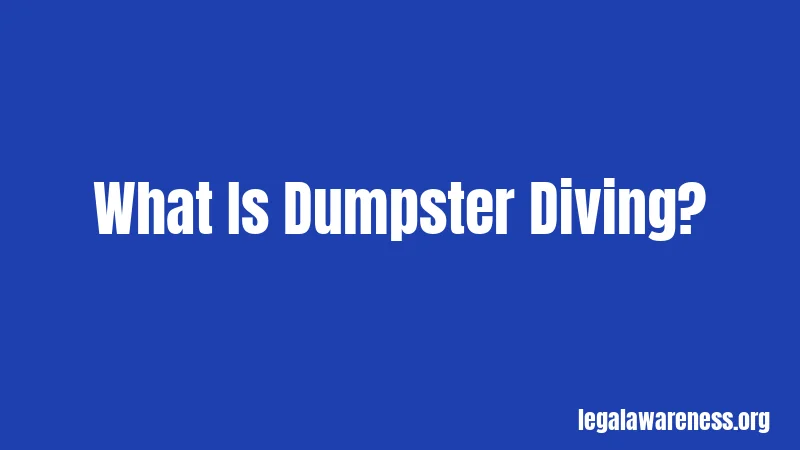Dumpster Diving Laws in Pennsylvania (2026): The Legal Gray Zone
Most people think dumpster diving is totally illegal. Turns out, they’re wrong. In Pennsylvania, the law is actually pretty surprising when it comes to digging through trash.
But here’s the thing. Just because something isn’t illegal doesn’t mean you can do it anywhere. Pennsylvania’s dumpster diving laws sit in this weird gray area where you’re technically allowed to do it, but you can still get arrested if you’re not careful. Let’s break down exactly what you need to know before you grab those gloves.
What Is Dumpster Diving?

Dumpster diving is when you search through trash for usable items. Some people do it to find food. Others hunt for furniture or electronics. Students search for textbooks. Homeless individuals look for basic necessities.
It’s not just about being broke, honestly. Lots of people dumpster dive to reduce waste. They’re fighting against how much perfectly good stuff gets thrown away every single day.
Pennsylvania’s State Law on Dumpster Diving
Here’s the deal. Pennsylvania has no specific state law that bans dumpster diving. Zero. The Pennsylvania State Police confirmed this in 2024.
Once trash hits the curb for pickup, it’s considered abandoned property. You don’t own it anymore. Neither does anyone else. That’s the basic legal principle.
Sounds simple, right? Hold on, it gets more complicated.
The Two Big Rules You Can’t Ignore

Wondering if you can just start diving anywhere? Not so fast.
Pennsylvania might allow dumpster diving at the state level, but there are two massive rules you absolutely have to follow.
Rule 1: Stay Off Private Property
If that dumpster sits on private property, you’re trespassing. This is where most people mess up. They think the trash is fair game, so location doesn’t matter.
Wrong.
Most dumpsters are actually on private property. Behind stores. In apartment parking lots. Next to office buildings. All private land.
If you walk onto private property to get to a dumpster, you’re breaking the law. Doesn’t matter if the trash is abandoned. You’re still trespassing.
Trespassing in Pennsylvania is a misdemeanor. You could face fines up to $10,000. You could spend up to five years in jail for serious violations. That’s no joke.
Rule 2: Check Your Local Laws
This one’s tricky. Even though Pennsylvania allows dumpster diving, your city or town might not.
Lots of Pennsylvania municipalities have their own ordinances. These local laws can completely ban trash picking. Or they add specific restrictions.
You gotta check your local rules before diving. Seriously. What’s legal in one town might get you fined $1,000 in the next one.
Local Laws Across Pennsylvania
Let me give you some examples. This might surprise you.
Lancaster City
Lancaster has strict rules. Their ordinance says only the owner or someone authorized can remove garbage from the curb. Same goes for dumpsters.
The fine? Between $50 and $1,000. That’s a hefty price for some trash.
Manheim Township
Similar story here. They follow the same basic rule as Lancaster. No unauthorized trash removal.
East Lampeter Township and Columbia Borough
These places focus on recyclables. You can’t pick through someone’s recycling bins. It’s specifically illegal.
Philadelphia
Philly has rules about trash collection times and loitering. You could catch a fine if you’re in the wrong spot at the wrong time.
Pittsburgh
Pittsburgh doesn’t have a blanket ban, but they regulate where and when. Noise ordinances matter. Littering laws apply.
Pretty much every major city has something on the books. Most people don’t realize how strict these local laws are.
What About “No Trespassing” Signs?

See a “No Trespassing” sign? That’s your cue to leave. Immediately.
Pennsylvania courts are clear on this. Those signs establish legal boundaries. Even if you didn’t see the sign because you entered from a different direction, it still counts.
Locked fences mean stay out. Gates mean stay out. Fenced-off areas mean stay out.
If you ignore these warnings, you’re asking for trouble. Police will charge you with trespassing. You might face theft charges too.
Public vs. Private: Where Can You Actually Dive?
Okay, so where’s it actually safe to dumpster dive?
Public Property = Usually Okay
Trash on public sidewalks is generally fair game. Dumpsters in public parking lots might be okay. Public areas where trash is clearly abandoned.
But even then, check for local ordinances first.
Private Property = Big Risk
Behind stores. In apartment complexes. Business parking lots. Residential driveways. All private.
You need permission to be there. Period. Without it, you’re trespassing.
One guy in Pennsylvania got charged with theft and trespassing after diving at a warehouse for a year. He thought he was fine because it was just trash. The police didn’t agree. He faced misdemeanor charges.
The Penalties You’re Actually Facing
Let’s talk about what happens if you get caught breaking these rules.
Trespassing Charges
Trespassing is a misdemeanor in Pennsylvania. Depending on the circumstances, you could face up to five years in jail and fines up to $10,000.
Most first-time offenders don’t get maximum penalties, honestly. But you’ll still have a criminal record.
Theft Charges
Yep, you can be charged with theft for taking trash. If someone claims the property is still theirs, you could face charges.
For items under $50, you might get a summary offense. That’s a fine up to $500. Items worth over $2,000? That’s a third-degree felony. Seven years in prison.
Local Ordinance Violations
Cities like Lancaster will hit you with fines between $50 and $1,000. That’s on top of any criminal charges.
Multiple violations add up fast. Keep that in mind.
ARD Program for First-Time Offenders
If you get charged, the prosecutor might offer ARD. That’s the Accelerated Rehabilitative Disposition program.
It’s basically probation for first-time offenders. Complete the requirements, and your charges might get dismissed. It keeps your record clean if you follow through.
Special Safety Concerns
Hold on, this part is important. Dumpster diving isn’t just about legal risks.
Physical Dangers
Broken glass. Sharp metal. Needles. Hazardous chemicals. Rotting food. All sitting in those bins waiting to hurt you.
You could get seriously injured. And guess what? The property owner isn’t liable for your injuries. Neither are the authorities.
You dive at your own risk.
Health Hazards
Medical waste sometimes ends up in regular dumpsters. Batteries can explode. Asbestos might be there. All illegal to throw away, but people do it anyway.
Food from dumpsters? That’s a gamble. Some is sealed and perfectly fine. Other stuff is a health hazard.
Personal Safety
Dumpster diving on private property puts you at risk of more than just legal trouble. You don’t know who you’re dealing with.
Property owners might confront you. Some people get aggressive. Dogs might attack. It happens.
How to Dumpster Dive Legally in Pennsylvania
Want to do this the right way? Here’s your game plan.
Step 1: Research Local Laws
Call your local municipality. Ask about trash picking ordinances. Check your city’s website. Don’t assume anything.
Five minutes of research can save you thousands in fines.
Step 2: Stick to Public Areas
Only dive in areas that are clearly public. Sidewalks where trash is set out for collection. Public dumpsters in parks or rest areas.
If it looks like private property, it probably is. Skip it.
Step 3: Ask Permission
Planning to dive behind a specific store? Ask the manager. Some places will say yes. Others will say no. Respect their answer.
Getting permission keeps you completely in the clear.
Step 4: Respect Property and Time
Don’t make a mess. Clean up after yourself. Don’t leave trash scattered everywhere.
Avoid late-night diving in residential areas. Noise complaints bring police. Stick to early mornings or right after dusk.
Step 5: Wear Protection
Heavy gloves are a must. Long sleeves. Durable shoes. A flashlight if it’s dark.
Protect yourself from sharp objects and nasty stuff.
Step 6: Leave No Trace
This one’s huge. If you leave the area looking like a tornado hit it, you’re giving dumpster divers a bad name.
People are way more likely to call the cops on you. Plus, it’s just disrespectful.
What About Commercial Dumpsters?
Big retail stores like Walmart, Target, and Ulta throw away tons of usable stuff. People find unopened makeup, sealed food, electronics, you name it.
But here’s the catch. These dumpsters are almost always on private property. Behind the store in a fenced area.
You need permission. Without it, you’re trespassing. Store policy matters too. Many retailers will prosecute.
Can You Dumpster Dive at Night?
Technically, yes. There’s no law that specifically bans nighttime diving.
But practically? It’s riskier. You attract more attention. Police are more likely to stop and question you. Neighbors call in suspicious activity.
Night diving also raises safety concerns. You can’t see as well. Wildlife is more active. It’s easier to get hurt.
If you go at night, be extra careful. Use a good flashlight. Stay alert. Don’t make noise.
The Ethics of Dumpster Diving
This might sound weird, but ethics matter here too.
Taking discarded trash is one thing. But what about recyclables someone carefully sorted? What about mail with personal information?
Some Lancaster County towns specifically ban taking recyclables. They see it as theft from the recycling program.
Personal documents in the trash? Those could be used for identity theft. Most people don’t realize that risk.
Be respectful. Don’t take things that clearly weren’t meant to be public.
How Much Money Can You Make?
Honestly, it varies wildly. Some dumpster divers report $10 to $50 per dive. Others find valuable electronics or furniture worth hundreds.
It’s not a reliable income, though. You can’t predict what you’ll find. Some days you score big. Other days you get nothing.
People who sell their finds online make the most money. Pawn shops, eBay, Facebook Marketplace. But it takes time and effort.
Best Times for Dumpster Diving
Want to maximize your finds? Timing matters.
Early morning right after stores close is good. Businesses dump stuff at the end of the day. You get there before trash pickup.
Just after dusk works too. Less crowded. Fewer people watching.
End of the month is popular. Retail stores clear out returns and damaged goods.
College move-out season is gold. Students throw away everything. Furniture, electronics, clothes, textbooks.
What About Pennsylvania Case Law?
Pennsylvania courts have ruled on trash privacy multiple times. The basic rule is clear.
Once you put trash out for collection, you’ve abandoned it. You have no reasonable expectation of privacy in that trash.
Police can search your trash without a warrant. Anyone can take it. It’s abandoned property.
But this only applies to trash in public areas. Trash on your porch or driveway is different. You still have privacy rights there because it’s on private property.
See how location matters? Same trash, different rules depending on where it sits.
What Happens If Police Stop You?
Let’s say you’re diving and police show up. What do you do?
Stay calm. Be polite. Explain what you’re doing. Don’t run.
If you’re on public property and following local laws, you’re probably fine. The officer might just tell you to move along.
If you’re on private property, you could be arrested. Don’t argue. Don’t resist. Comply with the officer.
You can explain your situation later. Fighting with police only makes things worse.
Alternatives to Dumpster Diving
Not comfortable with the legal risks? There are other options.
Community Sharing Groups
Facebook groups for freecycling. Neighborhood sharing networks. People give away stuff for free all the time.
Zero legal risk. Same concept as diving, but everything’s above board.
Store Clearance and Donations
Some stores donate unsold items to charities. Goodwill, Salvation Army, food banks. You can get the same stuff through these channels.
Ask Stores Directly
Some managers will let you take items they’re throwing out. Just ask. Worst case, they say no.
Best case, you get permission and avoid all legal problems.
The Bottom Line
Dumpster diving in Pennsylvania isn’t illegal at the state level. But that doesn’t mean it’s a free-for-all.
You have to stay off private property. You have to follow local ordinances. You have to respect “No Trespassing” signs.
Break these rules and you risk fines, jail time, and a criminal record. Over trash.
Is it worth it? That’s up to you. Just go in with your eyes open. Know the laws. Protect yourself. Stay respectful.
And when in doubt, skip that dumpster. There’s always another one down the road.
Frequently Asked Questions
Can I dumpster dive behind Walmart in Pennsylvania?
Only if you have permission and it’s not on private property. Most Walmart dumpsters are in fenced areas on private land, which makes diving there trespassing without permission from the store.
What’s the fine for dumpster diving in Lancaster, PA?
Lancaster city charges between $50 and $1,000 for unauthorized trash removal. This includes both curbside trash and dumpsters.
Is dumpster diving at night illegal in Pennsylvania?
No specific law bans nighttime diving, but you’re more likely to attract police attention and noise complaints. Daytime or early evening is safer legally and physically.
Can I get arrested for taking trash from the curb?
It depends on local laws. Curbside trash is generally considered abandoned property in Pennsylvania, but many cities have ordinances against taking it. Check your local rules first.
What should I do if a store owner catches me diving in their dumpster?
Leave immediately if asked. Apologize and explain you didn’t realize it was against the rules. If the dumpster is on their private property, you’re trespassing, so complying avoids criminal charges.
Final Thoughts
Now you know the real deal with dumpster diving in Pennsylvania. It’s legal at the state level but heavily restricted by local laws and property rights.
Stay smart about it. Research your area. Get permission when possible. Respect boundaries. Wear protection.
And remember, just because you can do something doesn’t always mean you should. Think about the risks, both legal and physical, before you dive.
Stay safe out there.
References
- Pennsylvania State Police – Information on abandoned property and trespassing laws – https://www.psp.pa.gov/
- Lancaster Online – Article on dumpster diving laws in Lancaster County (August 2024) – https://lancasteronline.com/news/local/is-it-legal-to-pick-through-other-peoples-trash-lancaster-watchdog/article_090dde5e-6411-11ef-86d0-b7be6c319f48.html
- Pennsylvania Crimes Code – Title 18, sections on trespassing and theft – https://www.legis.state.pa.us/
- California v. Greenwood, U.S. Supreme Court case establishing abandoned property doctrine for trash – https://supreme.justia.com/cases/federal/us/486/35/
- Reams Disposal Service – Guide to Pennsylvania dumpster diving regulations (June 2025) – https://reamsdisposal.com/dumpster-diving-pa-laws/
